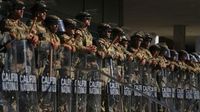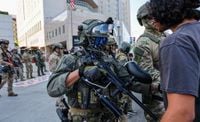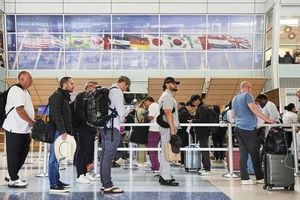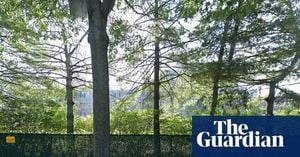In a case that could reshape the boundaries of presidential power and the military’s role on American soil, a federal judge in San Francisco is weighing whether former President Donald Trump violated federal law by deploying thousands of National Guard troops to Los Angeles during the summer of 2025. The three-day trial, which concluded this week, has drawn intense scrutiny from legal scholars, state officials, and civil rights advocates, all watching to see how the courts will interpret the 19th-century Posse Comitatus Act in the context of a modern political flashpoint.
At the heart of the dispute is Trump’s decision to send 4,000 National Guard members and 700 Marines to Los Angeles in June 2025, following protests sparked by a series of immigration raids conducted by federal agents. According to the Associated Press, the troops were initially deployed to protect federal property, such as a detention center that had become a focal point for demonstrators. However, their mission soon expanded, with Guard members accompanying immigration officers during arrests and, according to California officials, engaging in activities that crossed the line into direct law enforcement.
California Governor Gavin Newsom, who did not approve the use of his state’s Guard forces for these operations, responded swiftly, seeking a federal injunction to limit the military’s role. The state’s legal team, led by Deputy Attorney General Meghan Strong, argued that the deployment violated the Posse Comitatus Act, which generally prohibits the military from enforcing domestic laws. Strong told the court, “For all the pretense and wordsmithing defendants have tried to employ, the facts are inescapable: The activities defendants have ordered Task Force 51 troops to engage in across Southern California violate the Posse Comitatus Act.” She pointed to instances where troops detained individuals, set up roadblocks, and blocked access to public streets—actions she said went well beyond providing backup security.
The Trump administration, meanwhile, maintained that the deployment was both legal and necessary. Deputy Assistant Attorney General Eric Hamilton argued that the president acted within his authority, invoking a section of U.S. Code that permits federalization of the National Guard when “the president is unable with the regular forces to execute the laws of the United States.” Hamilton insisted that Guard members were not enforcing the law themselves, but rather providing protection for federal agents. “If the purpose is the protection of law enforcement officers, it isn’t law enforcement in the first place,” he said during the trial, as reported by the Associated Press. Hamilton further asserted that the president’s “constitutional inherent protective power” created an exception to the Posse Comitatus Act.
The trial featured testimony from several federal and military officials, including Army Maj. Gen. Scott Sherman, who commanded the joint military task force in Los Angeles. Sherman acknowledged that, at times, troops outnumbered federal agents—citing, for example, an immigration enforcement action at an illegal marijuana operation in Mecca, where about 300 soldiers were present alongside 200 federal agents. Sherman also described deployments to state-licensed marijuana nurseries in Ventura County and a dramatic show of force at MacArthur Park in downtown Los Angeles, which, according to San Francisco news sources, was intended to send a message to both undocumented immigrants and protestors.
Sherman’s testimony proved especially revealing. He told the court that he had raised concerns about the deployment potentially violating the Posse Comitatus Act, and that soldiers were specifically trained on activities prohibited by the law, such as conducting patrols, traffic control, crowd control, and riot control. Despite these precautions, Sherman recalled being told by superiors that there was a “constitutional exception” permitting such activities when the troops were protecting federal property or personnel. He also recounted that after expressing doubts about the legality of certain operations—like the parade of federal agents on horseback through MacArthur Park—he was accused by Border Patrol Chief Gregory Bovino of lacking loyalty.
Judge Charles Breyer, presiding over the case, has not hidden his skepticism about the Trump administration’s rationale. In a June 12, 2025, ruling granting a temporary restraining order against the federal government, Breyer wrote that the president’s “actions were illegal—both exceeding the scope of his statutory authority and violating the Tenth Amendment to the United States Constitution.” The Ninth Circuit quickly intervened, issuing a stay and later ruling that Trump likely acted within his authority to federalize the National Guard, but leaving the door open for further judicial review if the decision was made in bad faith.
Throughout the trial, Breyer pressed both sides on the limits of presidential power and the dangers of unchecked military involvement in civilian affairs. “We’re going to see federal officers everywhere if the president determines that there’s some threat to the safety of a federal agent,” Breyer remarked, questioning whether the law truly offered any “limiting factors” on the use of force. He also challenged the Justice Department’s claim that the Posse Comitatus Act did not apply, asking, “Then why is it the excellent Major General sought assurance that the Posse Comitatus Act was followed?”
California’s legal team sought not only to curtail the current deployment but also to establish a precedent limiting future presidential use of military forces in states without local consent. As Strong argued, “It would deny the basic principles of federalism for the state to have no legal recourse to challenge the conduct of these troops.” Legal experts, such as University of New Mexico Law School’s Josh Kastenberg, observed that while the Constitution and the law may be on California’s side, courts have historically shown deference to presidential authority in military matters—a legacy dating back to World War II.
Judge Breyer also questioned the ongoing justification for the presence of National Guard troops in Los Angeles, noting that the original force had been reduced by 90% but that 250 to 300 soldiers remained on duty as of August 2025. “Thank goodness for the National Guard, but why is the federalized National Guard still in place?” he asked. “What’s the threat today? What was the threat yesterday?”
The outcome of the case is expected to have far-reaching implications, not only for Trump’s stated agenda—he has repeatedly promised to send federal troops into cities he deems crime-ridden and uncooperative—but also for the delicate balance between state and federal authority. Judge Breyer has not set a timeline for his ruling, but both sides anticipate that the decision will be appealed, potentially reaching the Supreme Court.
As the legal battle continues, the citizens of Los Angeles—and the nation as a whole—are left to ponder the boundaries of executive power and the proper role of the military in American life. The case has become a flashpoint in the ongoing debate over federalism, civil liberties, and the enduring fear of a standing army wielded by a single individual.





